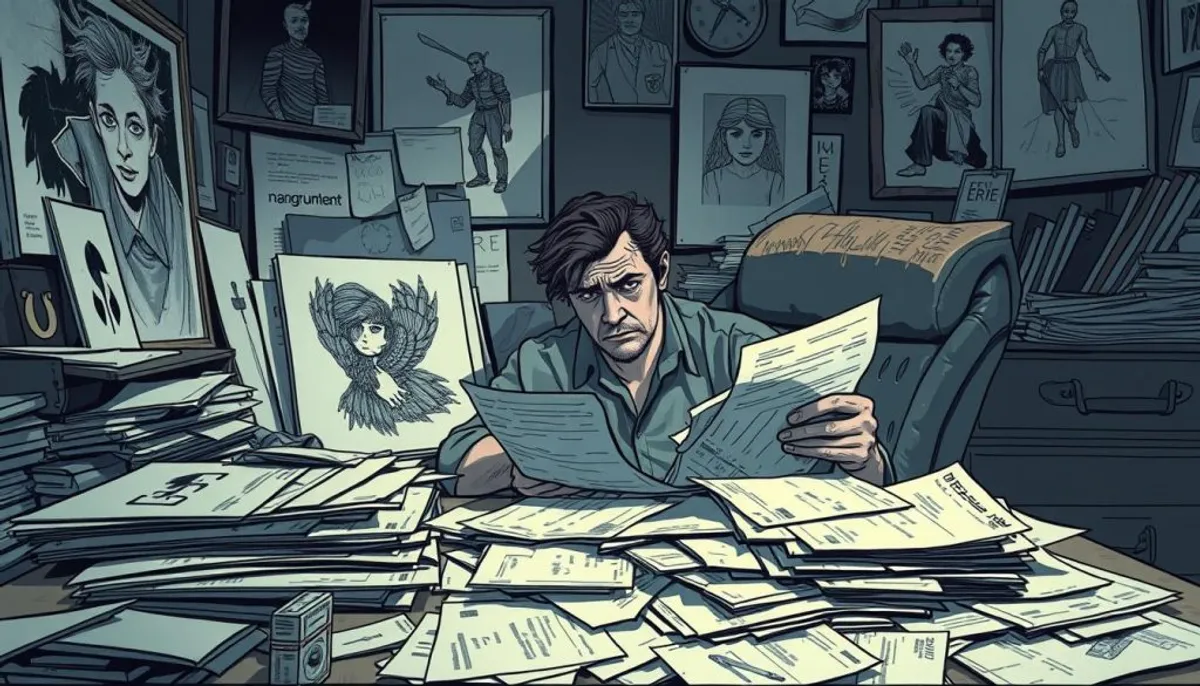If your business uses invoices, you might know about overdue and unpaid bills. Many reasons can cause customers to not pay on time or at all, like losing bills or unexpected costs. Small business owners often find it hard to ask for payment without being rude.
But, not getting paid can really hurt your business. You must take action to keep your cash flow strong. This article will share expert advice on handling clients who don’t pay. We’ll cover how to send reminders, use firmer methods, send formal demand letters, take legal action, and prevent non-payment from happening again.

Key Takeaways
- Understand the reasons behind non-payment, such as lost bills and cash flow issues.
- Use gentle reminders and follow-ups to encourage timely payment.
- Consider firmer approaches, such as setting deadlines and cutting off services, for persistent non-payers.
- Utilize formal demand letters and legal action as a last resort.
- Implement proactive measures, like upfront payment and clear payment terms, to prevent non-payment in the future.
Understanding the Reasons Behind Non-Payment
When dealing with clients who do not pay, it’s key to know why they don’t pay on time. Often, it’s not just about being lazy. It shows their own money troubles and cash flow issues.
Lost Bills and Unexpected Expenses
Some clients delay paying because they lost their bills or had sudden expenses. They might say they lost the invoice or need to check their records for the right payment amount. Sending new invoices and keeping in touch can clear up these excuses.
Cash Flow Issues
Many clients, like small businesses or individuals, struggle with cash flow issues. They might have tight budgets and complex finances. This makes them hesitant to pay their invoices. Knowing about their financial struggles can help you understand their situation better. It can lead to finding a way to solve the problem together.
| Reason for Non-Payment | Percentage of Clients |
|---|---|
| Lost Bills | 25% |
| Unexpected Expenses | 30% |
| Cash Flow Issues | 45% |
Gentle Reminders and Follow-Ups
When dealing with clients who do not pay their invoices on time, start with a friendly payment reminder. Most late payments are just an honest mistake. A polite follow-up usually gets the client to pay their unpaid invoices quickly.
Sending Friendly Payment Reminders
When sending payment reminders, check in on the client’s satisfaction with your services. Then, gently talk about any late or past-due late payments. Being friendly encourages the client to take action and clear up the outstanding balance.
Updating Invoices and Seeking Explanations
If a client keeps delaying payment, send an updated invoice. This can help clear up any excuses. Even if the client has the original, a new invoice removes claims of it being lost or needing to be reconciled. Also, asking the client why they won’t pay can give you insight.
Understanding their reasons, whether it’s dissatisfaction with the work or financial issues, can help find a solution. By being gentle and keeping communication open, you can often fix late payments and unpaid invoices without harsh actions.
Clients who do not pay: Firmer Approaches
When clients who do not pay ignore your messages, it’s time to act. For those who offer ongoing services, setting a clear payment deadline can motivate them to pay their unpaid invoices. Telling them that services will stop if they don’t pay can be a strong way to get their attention.
Setting Deadlines and Cutting Off Services
If a client won’t pay despite your reminders, you must be firmer. Tell them when you’ll stop providing services if they don’t pay. This shows you’re serious about getting paid on time and protecting your business.
- Clearly communicate the payment deadline in writing, giving the client a specific date by which the invoice must be paid.
- Explain that if the invoice is not settled by the deadline, you will have no choice but to suspend or terminate your services.
- Provide the client with options for making the payment, such as online payment or bank transfer, to make it as easy as possible for them to comply.
By being firm and setting a deadline, you can motivate the client to pay their unpaid invoice. This approach can help avoid service disruptions and solve the late payments problem.
| Approach | Potential Benefits | Possible Challenges |
|---|---|---|
| Setting Deadlines |
|
|
| Cutting Off Services |
|
|
Formal Demand Letters and Legal Action
When clients don’t pay their bills, you might need to send a formal demand letter. This letter clearly states the debt and what will happen if it’s not paid by a certain date. To make an effective demand letter, you should include several important parts:
- Provide details about the project and past invoices
- State the exact amount owed
- Set a clear payment deadline
- Warn that legal steps will be taken if payment is not made
If the client still ignores the demand letter, you might need to go to small claims court or sue. But, think about the costs, like money, stress, and time, versus the debt to see if it’s worth it. Talking to a lawyer can help figure out the best move.
Small Claims Court and Lawsuits
Going to small claims court or suing is a big step, needing a lot of time and effort. Yet, it might be the only way to get paid if clients ignore your demand letter. Before taking legal action, think about the costs and what you might gain to make sure it’s the right choice.
Proactive Measures to Prevent Non-Payment
As a professional copywriting journalist, it’s key to act early to avoid not getting paid by clients. Two good ways are asking for upfront payment and adding kill fees to your contracts.
Upfront Payment and Kill Fees
Asking for some or all payment before starting work makes sure you’re covered. Some clients might not like this at first, but it keeps your business safe from unpaid invoices or late payments. You can also have a “kill fee” in your contract. This means a part of the payment is kept if the client doesn’t like the final product.
Clear Payment Terms and Conditions
It’s also important to make your payment terms and conditions clear in your contract or invoice. This should include the project cost, payment times, late fees, and what happens if they don’t pay. Making sure the client knows these details from the start helps them pay on time.
By doing these things, you can greatly lower the chance of not getting paid and keep your business safe from unpaid invoices and late payments.
Factoring and Debt Collection Services
Businesses often face challenges with unpaid invoices and late payments. Factoring and debt collection services can help. They offer solutions for companies waiting for clients to pay their bills.
Invoice factoring lets businesses sell their unpaid invoices to a third party. This company then gets the payment from the client. Businesses get 70-90% of the invoice’s value upfront, improving their cash flow. It’s a big help for clients who do not pay on time.
For debts that are way past due, a debt collection agency might be needed. These agencies use their skills to get back the owed money. They know how to deal with the legal side to help the business.
- Factoring gives businesses quick cash by selling unpaid invoices to another company
- Debt collection agencies focus on getting back payments that are really late using legal ways
- Both services are key in solving problems with clients who do not pay and late payments

Using factoring and debt collection, businesses can act fast to deal with unpaid invoices. They can keep their finances strong, even with tough clients who do not pay.
Building Strong Client Relationships
Keeping good, clear relationships with clients is key to avoiding non-payment issues, unpaid invoices, and late payments. It’s important to talk clearly about the project, costs, and payment plans right at the start. This helps set clear expectations and builds trust with clients.
Businesses should keep talking openly with their clients during the project. They should quickly address any worries or changes that come up.
Effective Communication and Transparency
Being open and quick to respond can really help build strong client relationships. Talking clearly about what the project will cover, when it will be done, and how payment will work can prevent non-payment problems later. Checking in regularly and keeping clients updated on the project’s progress shows you care about their goals.
Understanding Client Goals and Adapting Style
Businesses should also try to understand what their clients’ goals are. They should change how they talk to clients to fit what the client likes. This might mean being more formal or informal, or using different ways to communicate.
By being flexible and showing you care about the client’s needs, businesses can build stronger, more trusting relationships. These relationships are less likely to have non-payment or late payments.
Maintaining Professionalism and Boundaries
As a professional copywriter or journalist, it’s key to stay professional with clients who do not pay or are late with unpaid invoices. Going the extra mile can strengthen relationships. But, it’s vital to set clear boundaries and avoid overselling or making promises you can’t keep.
Being professional means always delivering top-notch work that meets or beats what the client expects. This shows you’re reliable and builds trust. Trust is key for strong, lasting relationships. By sticking to the agreed-upon scope, you won’t disappoint the client and are more likely to get paid on time.
Exceeding Expectations without Overselling
Finding the right balance between exceeding expectations and overselling is crucial. Going above and beyond is good, but promising too much can lead to letdowns and non-payment. Instead, focus on consistently meeting the client’s reasonable expectations with your professionalism, detail focus, and reliable service.
- Manage client expectations by clearly communicating the scope of work and timeline
- Deliver high-quality work that consistently meets or exceeds the agreed upon standards
- Respond promptly to client inquiries and address concerns in a professional manner
- Avoid making promises that you cannot realistically fulfill, as this can undermine trust and lead to late payments
By being professional and setting clear boundaries, you can create lasting, beneficial relationships with your clients. This is true even when facing non-payment or late payments.
Streamlining Invoicing and Payment Processes
Efficient invoicing and payment processes help avoid non-payment from clients who do not pay. It’s important to send invoices right after finishing a project. Also, set up payment reminders automatically and offer many payment options.
To get payments on time and avoid late payments or unpaid invoices, make sure your invoices are clear. They should have all the important info like due dates and late fees. A simple payment process makes clients happy and builds strong relationships.

- Sending invoices quickly after a project ends
- Using automated payment reminders to tell clients when payments are due
- Providing many payment options, like online payments, bank transfers, and mobile wallets
- Keeping invoices simple and complete with all needed details
- Checking and updating payment processes often to make them better and keep clients happy
By using these tips, businesses can make their invoicing and payment processes smoother. This helps with cash flow and lowers the chance of non-payment from clients who do not pay.
Conclusion
Dealing with clients who don’t pay can be tough for many businesses. But, there are ways to protect your earnings and improve your client relationships. You can use reminders, firmer actions, and even legal steps to get paid.
It’s important to start with strong, clear relationships with your clients. Set clear payment terms and communicate well. This way, you can lower the chance of not getting paid and keep your cash flow healthy. Even when issues come up, being firm yet professional can help you handle them better.
Managing clients who do not pay, unpaid invoices, and late payments needs a balanced strategy. This includes debt collection, legal action, and taking care of client relationships. This way, you protect your business, keep your cash flow safe, and set yourself up for success.
RelatedRelated articles



